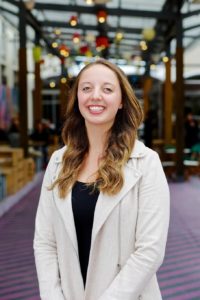
My name is Sarah and I am in my third and final year of a Bachelor of Medical Science. One of the best features of this degree is the number of different course area offered after completion for postgraduate study. Over the past year I have been considering my different options once I complete my degree, and I have decided to apply to study a Master of Speech Pathology in 2019.
One experience that helped me make this decision was the knowledge I gained during my two-week volunteer work experience opportunity at Talking Matters; a Speech Pathology and Occupational Therapy practice. The staff at this practice provide therapy, assessment, diagnosis and innovative group programs for children. This work experience opportunity not only helped cement my decision to apply for a degree in Speech Pathology, but also informed me on the many different types of work a Paediatric Speech Pathologist fulfils.
I was able to participate in the running of three summer workshop programs; a School Readiness program for children aged 4-6 years old, a Social and Emotional Development program for children aged 7+, and a Food and Cooking program for children aged 4+. The most enlightening of all programs was Food and Cooking. Within this program children were exposed to and encouraged to try multiple foods, condiments and beverages they may or may not have been exposed to previously, and then prepare and cook a shared meal with those ingredients. An example of one of the shared meals prepared and cooked were burgers. It was interesting to see the approaches a speech pathologist would take to help improve a child’s difficulty in chewing and moving food around in the mouth, explore new foods, complete small meals, broaden their restricted diet, and work with their sensory preferences towards or away from certain foods. This type of work as a speech pathologist was completely new to me.
The Social and Emotional Development program opened my mind to the basic social skills taught by speech pathologists that we take for granted in our everyday life. One area addressed to the children in this program was the understanding and performing of social etiquette when in conversation with someone, such as giving personal space and asking about the other person’s day. It was fascinating to watch the tactics and tools the speech pathologists used in this program to help children understand social expectations, get along with their peers, know how to manage their emotions, feelings and behaviour productively, and manage the challenges of the school yard.
The overall work experience was very enlightening. The best part was being able to see myself in such a working environment helping children improve and develop in the many areas addressed. I encourage anyone to organise and participate in work experience within their breaks to help validate their decision for their chosen career path. I am now very looking forward to commencing my studies in speech pathology and for the career that lies ahead.

